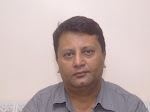---Sunil Sharma
In the Republic, Book X, the distrust of poets and poetry is made explicit by Socrates: He wants both banished from his ideal state. That was done in 360 B.C.E but Plato’s famous ghost still haunts the world even to-day in the second decade of the new millennium. Although ideal republic remains a dream and philosopher-kings could never happen in real, the cynicism persists. In globalised economy dominated by the trans-national capital, New Philistinism rules. All spiritual production is suspect; all use-values are meaningless. Poets are mad. By extension, artistes are dangerous. Modern schizophrenia cites classic cases of Van Gogh, Sylvia Plath and Virginia Woolf. Suicide of these gifted children of God are romanticized; their pain forgotten by the cruel world in search of myths of mad prophets and misfit poets unable to legislate a commercial world since commerce recognizes material wealth and not radical ideas that can change the status quo.
Not much has altered. A poet and thinker Louis Kastakin of Wakefield, UK, sits on a fast to demand his right to dignity and suitable work. Unemployed in last five years, this excellent versifier is unwanted in the post-Thatcher England. Wordsworth and Dickens predicted this for their dear England and now it is recurring. Hard Times are here again. Utilitarian ideology prohibits poetry. Artists are persona non grata. They must be starved and banished and crucified. And madness and suicide of such tender souls glorified! Milton in 1642 pinned this sonnet on his door as an appeal to the marching King and his army and expected humane treatment from the soldiers:
Sonnet VIII. When The Assault Was Intended To The City
Captain or Colonel, or Knight in Arms,
Whose chance on these defenceless dores may sease,
If ever deed of honour did thee please,
Guard them, and him within protect from harms,
He can requite thee, for he knows the charms
That call Fame on such gentle acts as these,
And he can spred thy Name o're Lands and Seas,
What ever clime the Suns bright circle warms.
Lift not thy spear against the Muses Bowre,
The great Emathian Conqueror bid spare
The house of Pindarus, when Temple and Towre
Went to the ground: And the repeated air
Of sad Electra's Poet had the power
To save th' Athenian Walls from ruine bare.
That shows Milton’s belief in the power of poetry over the forces of war. It is symptomatic of the history of humankind: Poetry and civil society were never in easy alliance. Poetry questions; power hides. The disdain of the elite is clear. Poets are to be starved, ridiculed and ostracized. Nothing has changed vis-à-vis poets and poetry. Louis Kastakin’s long-term unemployment proves that beyond doubt. It is darkest hour for us. An unemployed bard in post-industrial, post-modern society is a greatest moral indictment of a culture that promotes utilitarian credo and bans the liberal arts.
Poets of the world, unite!
